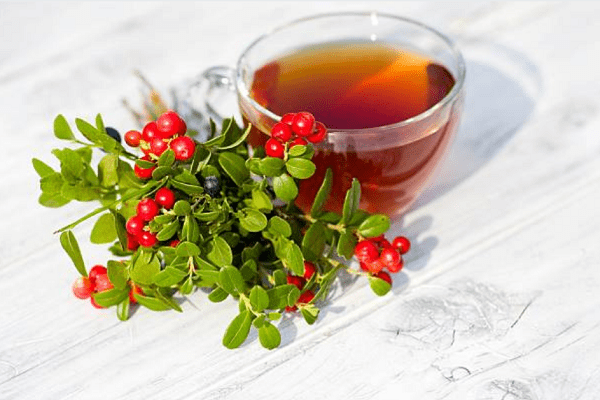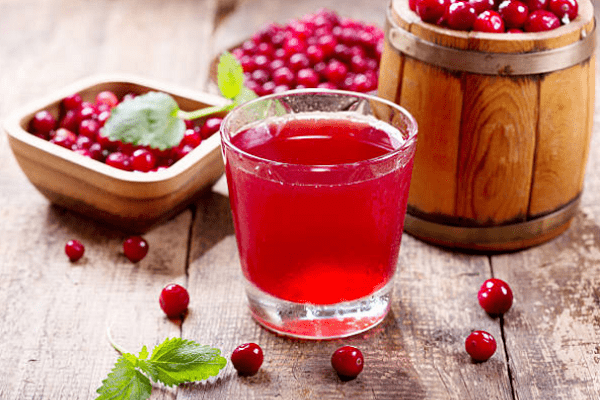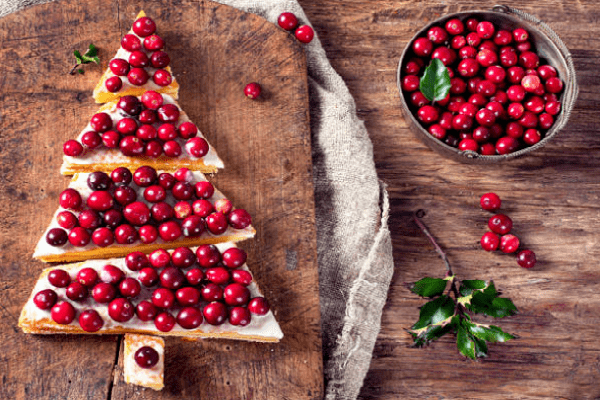Herbal medicine recipes >>>> Lingonberry is a medicinal berry
Lingonberry is a medicinal berry.

Lingonberry is a plant that can rival only Cranberries and Blackberries in its useful properties. Lingonberry has practically no natural elements equal in composition. The most complete set of natural acids - tartaric, acetic, citric, malic, benzoic - allows Lingonberry berries to compete with all fruits and berries. The trace elements contained in the berries of this plant form the basis of all vitamin and mineral complexes - salts of Potassium, Magnesium, Iron, Phosphorus, Calcium, vitamins P, C, provitamin A (carotene), pectin and tannins.
The high content of natural sugars (fructose, glucose, sucrose) in Lingonberry berries (fully ripe) includes the plant in the composition of medicinal and food products approved for diabetes.
Despite the fact that the Lingonberry plant is usually found in the wild, you can breed a lingonberry plantation on your own site, since the plant is unpretentious to temperature conditions, but has special requirements for the soil, which will have to be formed close in content to the natural soil conditions for the growth of the Lingonberry plant. The only drawback of domesticated Lingonberry is fruiting no earlier than three years after the life of the plant. The decorative look of the lingonberry plantation will decorate any yard, and especially diligent owners will be able to grow lingonberry bushes even as a pot culture.
The obvious benefits from the nutritional value of the plant and the medicinal properties of Lingonberry berries became the reason for including Lingonberry in the list of medicinal plants.

Lingonberry berries have many diverse properties that have an effective therapeutic effect on the human body. Fresh Lingonberry and Lingonberry Juice is a remedy that enhances the action of digestive enzymes and increases appetite. For this reason, fresh berries and lingonberry juice are not drunk on an empty stomach, but only during or after meals.
The antiseptic properties of lingonberry juice allow the prevention of gastrointestinal infections, but with disorders such as intestinal dysbiosis, raw lingonberry berries can aggravate digestive disorders associated with poor digestibility of dairy and lactic acid products.
Infusions from dry berries of Lingonberry and Lingonberry juice have a mild laxative effect. An infusion of lingonberry leaves has a diuretic effect. But the high content of tannins in the berries and leaves of Lingonberry makes Lingonberry teas and the Lingonberry fruits themselves a fortifying agent, for this reason, excessive enthusiasm for eating Lingonberry jam, Lingonberry berries or drinking Lingonberry drinks can lead to constipation, and moderate consumption of lingonberry products and infusions has a beneficial effect on Gastrointestinal tract.
Lingonberry berries, due to the content in them of a large amount of benzoic acid, are not very susceptible to rotting, which allows you to keep the harvest of berries for a long time without heat treatment or freezing. The same natural acid provides the fruit of the plant with the properties of an antiseptic, which can be used orally for various kinds of disorders associated with an unknown kind of infections of the digestive tract. In fact, a drink made from fresh lingonberry berries, mashed or squeezed into juice, resembles a prophylactic agent for diarrhea of a presumably infectious nature, and the tanning substances in the pulp of the berries form a protective film for the intestinal mucosa, and also provide a fortifying effect, pectins gently envelop the mucosa The gastrointestinal tract, not allowing it to be injured by coarse or poorly digested food.
In addition to their obvious properties that affect digestion, Lingonberry berries are a good diaphoretic and good vitamin support for immunity during the off-season and winter lack of vitamins.
Lingonberry berries are easy to store in reserve due to the fact that they do not tend to mold during drying. For medicinal infusions, the leaves of Lingonberry are also collected - the leaves are collected during the period of budding or flowering of the plant. Berries are recommended to be picked exclusively at the stage of full ripeness in order to avoid the presence in unripe berries of an excessive amount of tannins and a lack of useful acids, vitamins and microelements, which are fully accumulated only by the time the berries are fully ripe. Lingonberries are those fruits of the plant that can be harvested in an overripe form, which is usually unacceptable when harvesting other types of berry crops.

Almost all lingonberry preparations have a healing effect. Dried and frozen berries, berry preserves and jams, lingonberry sauces, lingonberry drinks (including alcoholic ones), added to dishes or to dishes of ordinary cuisine, turn dishes into medicinal ones. It is very useful to make preparations from lingonberry berries by soaking as an independent product, and as part of other preparations (pickled or sauerkraut, apples, peppers, tomatoes).
Lingonberry berries can be soaked (fermented) or pickled in their own juice. Any vegetables, fruits and berries can be fermented, soaked or pickled in Lingonberry juice. The lingonberries themselves can be preserved in their own juice according to the same recipe as cherries. Lingonberry juice is an ideal preservative for any vegetables, fruits, berries, herbs and roots.
Lingonberry marinade is suitable for any type of meat and improves the digestion of meat products. It is with meat dishes that Lingonberry sauce or Lingonberry juice is ideal. Lingonberry sauce, sauce or juice are successfully combined with fish dishes, seafood, green salads. For those who do not like citrus fruits or their juice in the composition of dishes, the juice or pulp of Lingonberry berries is suitable.
Due to the high content of pectin substances in berries, it is easy to make jelly or marshmallow with a healing effect from them, which are much more pleasant to use than food additives of similar properties. Lingonberry jelly and pastille can also be made in combination with other fruits and berries of a similar composition, for example, apples, plums, pears, physalis.
The Lingonberry plant has a very wide application, therefore, it is always useful to have Lingonberry leaves and berries in the form of a blank for a home medicine cabinet and culinary delights.

Read

Read



























